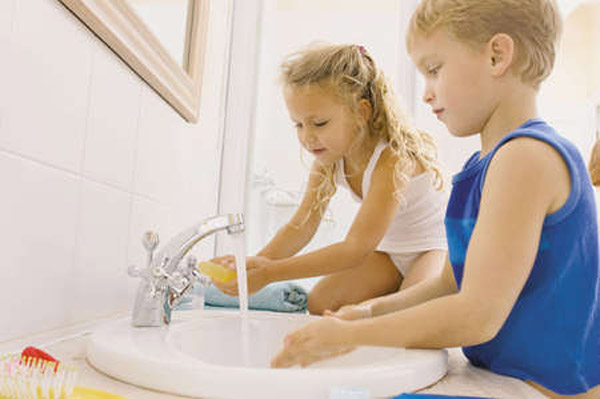
Hygiene is a necessary part of our existence. Staying clean keeps you away from many preventable diseases. Just the simple act of washing hands regularly and thoroughly can keep at bay health problems like diarrhea, intestinal problems, eye infections and even lowers the risk of respiratory infections. Practicing hygiene is simple and as long as you make it a habit, you’ll follow it without even thinking. Kids, in particular, need to pay special attention to cleanliness as they’re more susceptible to infections and diseases. As a parent, it is essential that you teach your kids to follow certain hygienic practices. And if you have very young children, then take it upon yourself to do it for them.
To help you out, we’ve compiled a list of 6 areas of hygiene for your kids.
1. Washing hands
As stated above, hand cleanliness is one of the most important hygiene condition. Adults and children, all use their hands to touch and grasp. Surfaces of areas and objects can get pretty dirty so even if you think that just flushing the toilet is enough. Know that flush handles and seats are a breeding ground for bacteria. Make it a point to wash your kid’s hands with soap and water to get rid of germs.
Children love to play and can become grimy after a play session. Their curiosity also leads them to touch things that adults normally wouldn’t. And as it can be a hassle keeping an eye on them all the time, teach them to wash their hands after every play session. To ingrain the habit as well as make it fun to do, sing along with him (a nursery rhyme or favorite song), building a rhythm to the song while he washes between his fingers, palms and the backs of his hands.
2. Brushing teeth the right way
Many of us grow up with cavities and other teeth problems due to poor dental hygiene. Teach your kids to brush their teeth twice a day, after waking and before sleeping. Choose a toothbrush that is modeled along his favorite cartoon or comic hero. This will help him get into the habit of brushing his teeth and enjoy it as well. Teach him to clean every part of his pearly whites the right way. Up and down for the canines and incisors and a circular motion for his molars. Make it a point to rinse his mouth after every meal too as that will clean out any substances that get lodged between the teeth. It’s never too young to begin getting your kid used to brushing. In fact, experts say that children should begin brushing from as young as one year of age.
3. Tongue cleaning
While brushing teeth is important, the tongue shouldn’t be left out. With food and bacteria trapped on the tongue’s surface, it is a must that your child learns to scrape off whatever is left on the tongue. A toothbrush can suffice for this but make sure it isn’t too rough to prevent abrasions.
4. Bathing daily or twice a day
Summer means sweat and sweat means grime. And kids can really sweat a lot while playing. It’s advised that children should bathe twice a day in summers to remove any dirt or impurities. Most children hate taking showers (think back when you were a kid!) so you need to manipulate them a little. Tell them they’ll be rewarded with a treat if they bathe.
Teach your child to clean all areas of his body thoroughly like armpits, groin, behind the ears, feet, bottom and head. Show him how to do it and he’ll get it after a few tries. If you have a tub, then you won’t have to try so hard as you can place toys in the bath. He’ll have the opportunity to play as well as clean himself.
5. Cleaning the ears
If you take the time to notice, you’ll see a lot of squeaky clean people with waxy ears. Aside from the fact that it can look rather gross, dirty ears can cause irritations and infections. For your child, especially if he is very young, experts advise that his ears be cleaned by a doctor to avoid hitting too deep. If you’re doing it yourself, then make sure that the Q-tip is soft and clean the exterior parts or the parts that can be seen. Avoid digging in as it’ll cause a lot of pain and can damage his ear.
6. Potty training
Your child should be taught how to wipe himself after each toilet session. While very young kids may not be able to do it, teach him so that he can manage on his own after a few years. Don’t forget to make him wash him hands thoroughly after wiping.




